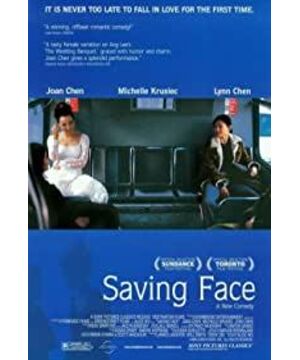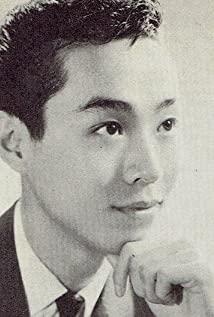1
As the saying goes, a man needs a face, a tree needs the bark, and a telephone pole needs cement.
It is understandable that the tree needs bark. After all, it relies on the conduits in the bark to transmit the nutrients absorbed by the roots. It is impossible to have no bark. As for the telephone poles-maybe mainly for the purpose of forcing rhymes, in fact, it does not have to be cement, just wood.
So, who wants a face?
2
The so-called face of a person means to be a decent person and conform to the mainstream society. According to modern parlance, it is to do things according to the rules and be a person according to the general ethics.
In the film "Face", Xiaowei's grandfather, Professor Gao, lived his life with such a concept - people must have face .
As a highly respected elder in the American Chinese community, Professor Gao always believed that the Chinese should respect the thousands of years of traditions of Chinese civilization and adhere to the strict rules and precepts of Confucian culture.
In fact, not only Professor Gao, but also the older generation of Chinese in the entire Chinatown Chinese community.
But this is not the case with the younger generation.
And this is where the dramatic conflict that drives the whole story forward.
3
Generally speaking, the film tells the story of three generations: Xiaowei (played by Yang Yahui), mother Gao Huilan (played by Chen Chong), and grandfather Professor Gao (played by Wang Jin).
One of the interesting things is that the language of the shots at the beginning of the film makes us involuntarily regard Xiaowei as the protagonist of the story. But in fact, in the middle school Chinese class, the teacher told us that the clue characters and the protagonists are different.
Although Xiaowei's role is very important, the ideological core that the creator wants to express cannot be fully reflected in her, and the film is not just a simple story about homosexual love.
In my personal opinion, the real protagonist of the film should be Gao Huilan, the mother played by Chen Chong.
4
As a second-generation Chinese woman who has lived in the United States for decades, she has never walked out of Chinatown in her entire life, and cannot even speak English, Gao Huilan is deeply influenced by the traditional Chinese culture instilled by her previous generation.
Like her parents, she is ashamed to talk about sex, but she is eager to arrange marriage for the next generation, rejecting skin color other than Chinese, and does not accept homosexuality...
However, such things as culture and ideas will penetrate and blend with each other.
Even if you never leave Chinatown for the rest of your life, your children and other Chinese people of the next generation will complete the changes in small groups in the big environment through education. These ABCs are no different from other native Americans.
Therefore, due to their influence, Gao Huilan felt the dilemma between traditional culture and liberating nature.
5
One of the designs is very ingenious, that is, Xiaowei lost her father early. Under the protection of her parents, Gao Huilan, who lived as a widow, lived like a child until she was 48 years old - sometimes, Xiaowei is more like a child. It's that mother.
The absence of a husband makes Gao Huilan, who has been living with her parents all the time, relieve the constraints of traditional culture in a sense.
On the one hand, in the eyes of many traditional parents, as long as you get married and have children, then our task for you has been completed, and we don't need to take you too seriously. On the other hand, the lack of husbands in traditional culture also prevents Gao Huilan from being immersed in the so-called "Woman's Way" thought all day long.
Therefore, compared with Professor Gao and other older generation Chinese who are deeply entrenched in ideology, Gao Huilan is more likely to accept those "foreign" concepts of freedom.
The perennial widowhood also created objective conditions for her bold pursuit of love.
6
So, in the final analysis, the whole story is really about two different cultural ideas - or the conflict between the mainstream culture and the marginal culture.
But the most commendable thing is that the marginal cultures that appear in the film do not place themselves in the position of a disadvantaged group anywhere:
The reason why Gao Huilan did not reveal the identity of the child's father was not because she thought it was against traditional morality, but just because she was worried that the other party would not have the courage to take on this relationship; the relationship between Xiaowei and Vivian was not like that. Like many movies about gay themes, they have been emphasizing that they are gay - in this story, even if Xiaowei is directly replaced by a male character, the relationship is completely established; finally, facing Xiaowei's mother, she completely wrote In the face of discomfort, Jay never stood on the commanding heights of political correctness to accuse the other party of racism, but remained as usual.
It is precisely because of this that the eventual reconciliation between the two cultures is all the more powerful.
7
At the end of the film, Xiaoyu finally bravely confessed his love affair with Gao Huilan, who was several decades older than him, and Xiaowei also hugged and kissed Vivian at the Chinese party.
It turned out that if you want to break the shackles, you must first muster the courage.
Speaking of it, this phenomenon in the Greater China circle is really strange: no matter how much parents try to control or restrain their children in the first place, if children make choices that go against their expectations, they will eventually Choose to accept - even if you keep saying it's not.
This is another saying: Tears flow down after all.
As for the rest of the cultural circle? At most, they talk behind their backs, and as long as you don't care, they can't do anything to you.
8
This is where the cultural traditions of our environment are interesting.
If you are obedient and not brave enough, they will control you and restrain you from the commanding heights of traditional morality; but if you muster up the courage to speak your true heart, they will have nothing to do with you morally, and in the end they can only choose to accept it. and change.
A tree without bark will surely die. Without morals, anything is possible.
The above sentence is by no means derogatory.
Finish.
View more about Saving Face reviews










